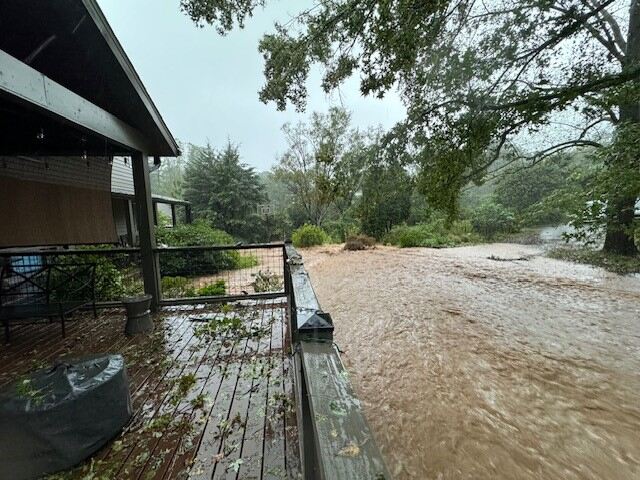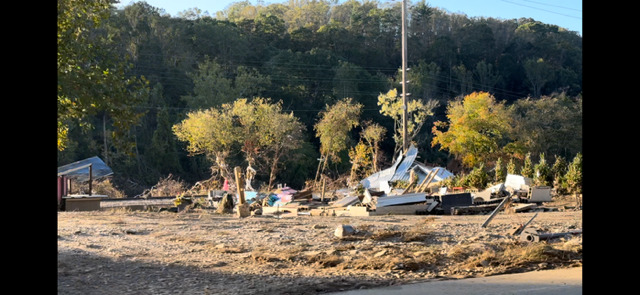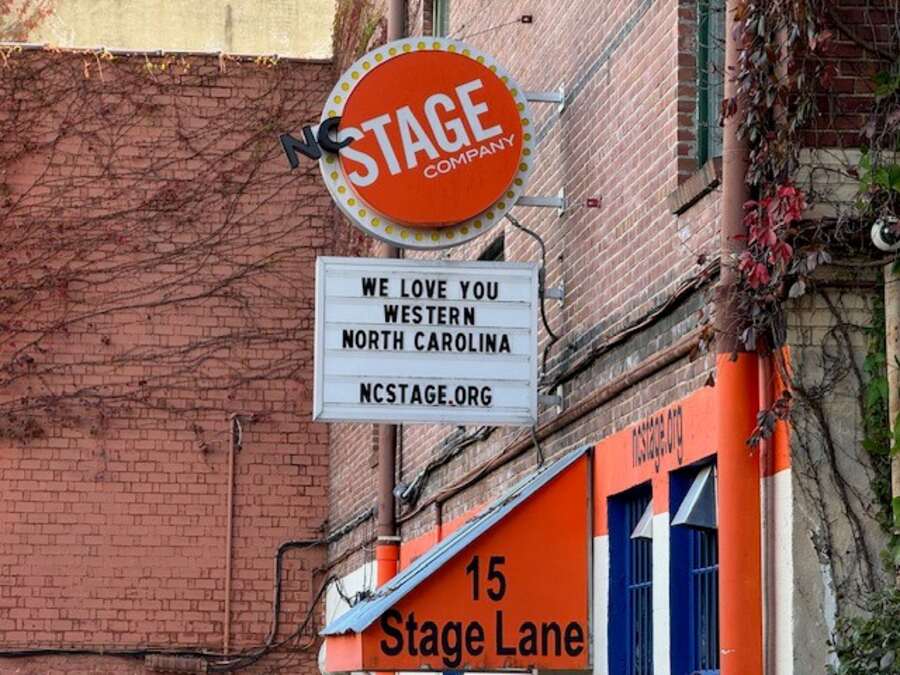Charlie Flynn-McIver broke his foot a month ago, but recovery has been steady and just last Friday his doctor gave him the all-clear for him to put “100 percent weight” on the broken foot.
“But I’m sure they didn’t mean, ‘Carry 80 pounds of water and furniture from your flooding garage,’” said Flynn-McIver, artistic director and co-founder of North Carolina Stage Company in Asheville, North Carolina, who in the past week has watched his city get pummeled by Hurricane Helene as it cut a deadly swath from Florida’s Gulf Coast up through Georgia, Tennessee, Virginia, and Western North Carolina. Waters in Asheville rose while winds tore up highways and wiped away buildings, making egress and relief efforts even more perilous.
Thankfully his theatre sustained no major brick-and-mortar damage, with its mainstage located in Asheville’s relatively unscathed downtown district. Even the company’s rehearsal space, located in Asheville’s arts district along the French Broad River, has emerged without major damage. The rest of Asheville has not been so fortunate, said Flynn-McIver.
“Power is on at theatre but at none of our houses,” he wrote in an email. “Internet is out, but we’re able to piggyback on a generous neighbor business.” A more pressing issue: “Water is out and will be out for the foreseeable future.” He managed to reach us via phone, charged at the theatre’s rehearsal space, and said that word on the street is the city’s water problem might last as long as a month, leaving residents mainly reliant on bottled water and more manual filtration. (At his home, he said he’s using an electric pump to flush his toilet with water from a nearby stream.)
The theatre, whose budget is close to $630,000, was supposed to open Audrey Cefaly’s The Last Wide Open on Oct. 10, but that has been postponed as the theatre figures out next steps. As Flynn-McIver put it, “It seems wrong to sit in a staff meeting and discuss the marketing aspects of a play and when the floor should be painted, when the local radio station is still reminding people who are trapped and can hear the broadcast but can’t communicate to put large white bedsheets on their roof so the military rescue helicopters can see them.”

Asked about other nearby theatres, he mentioned that he’d heard the large Diana Wortham Performing Arts Center has been a FEMA staging site, but has not heard about the status of Montford Park Players, the state’s oldest outdoor Shakespeare theatre, or Asheville Community Theatre.
He added that, while he recalls some local flooding in 2004, he’d never experienced the “sheer force” of Helene’s rapids-like waters and tornado winds. “I mean, it’s one thing to see a roof peeking out from the water,” he said. “It’s another thing to see these places that you frequent every week totally blown away.”

He continued, “Though physically we are okay, we are concerned about the financial losses for us and the community as a whole. I know you know this, but a lot of people don’t: We’re not recovered yet from the pandemic.” He said he felt the need to correct a well-meaning donor who was celebrating that NC Stage “had made it through Covid. It was only four years ago that we were placing 30-foot screens of the Zoom audience in front of a solo performer so he could interact with the audience. It was only three years ago we were becoming experts in epidemiology and mechanical engineering to open up in-person performances to socially distant seating. And though last year was restriction-free, audiences are still slow to come back.”
As he and NC Stage regroup and the city of Asheville is faced with what Flynn-McIver called “more of a rebuilding than a repair, which is a different animal,” he wanted to get out the message that the post-Covid-lockdown era “ain’t over. That’s what makes this moment for us even more surreal. I don’t mean to bemoan my own state, but rather to raise awareness of the entire industry’s fragility in this moment.”
To help Western North Carolina and other areas in the Southeastern U.S. that have been devastated by Hurricane Helene, go here. For arts recovery resources for artists and other creative workers, go here.


